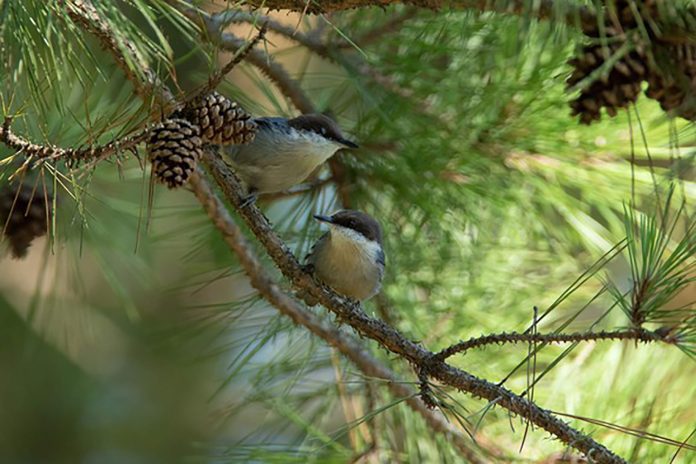
JEFFERSON CITY, Mo. – Biologists with the Missouri Department of Conservation (MDC) say reintroduced Brown-headed Nuthatches are dispersing well within restored pine woodland habitat in the Missouri Ozarks.
MDC and partners recently finished the third year of ongoing efforts to reintroduce Brown-headed Nuthatches in the U.S. Forest Service’s Mark Twain National Forest. In the first two years, 2020 and 2021, 102 birds were translocated to the Eleven Point Ranger District of Mark Twain National Forest. In Aug. 2024, MDC and partners released another 95 nuthatches to the same area. Monitoring efforts have been ongoing, and signs have shown released nuthatches move long distances across the landscape, but researchers did not know just how far these birds were dispersing until recently.
On Oct. 2, a group of conservation partners who were touring a pine woodland restoration site at Pioneer Forest, owned by the L-A-D Foundation, heard the iconic squeaks of two Brown-headed Nuthatches. This was a remarkable discovery because these nuthatches were nearly 30 miles away from the original release site in Mark Twain National Forest. That may not sound like a long distance, but to a tiny bird that doesn’t migrate, that’s quite far.
“Not only have these nuthatches dispersed a great distance, one of them did not have leg bands – meaning it was born in Missouri,” explained MDC State Ornithologist Kristen Heath-Acre. “This is such an exciting documentation because it means these birds are moving across the landscape, finding good pine woodland habitat, and breeding.”
Brown-headed Nuthatches are only found in pine woodlands where pines are mature, the canopy is mostly open to sunlight, and there are plenty of well-decayed snags for nesting. This species was likely extirpated from Missouri in the early 1900s when the last large swaths of shortleaf pine woodlands were removed by intensive harvest and logging. The Ozark landscape regrew into primarily oak-hickory forest, which is unsuitable for Brown-headed Nuthatches. However, decades of pine woodland restoration by the Mark Twain National Forest and other partners has returned the Brown-headed Nuthatch habitat to the landscape.
“Finding these birds have moved across the landscape validates all of the hard work the L-A-D Foundation, Mark Twain National Forest, MDC and others have done restoring the landscape to historic pine woodland,” said Heath-Acre. “If you build it, they will come – with a helping hand.”
Partnerships in Missouri’s Brown-headed Nuthatch restoration include U.S. Forest Service’s Mark Twain National Forest, Ouachita National Forest and Northern Research Station, the University of Missouri, Central Hardwoods Joint Venture, U.S. Fish and Wildlife Service, Missouri River Bird Observatory, Arkansas Game and Fish Commission, and more.
Learn more about the Brown-headed Nuthatch on the MDC website at https://mdc.mo.gov/discover-nature/field-guide/brown-headed-nuthatch.















